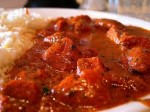

How you doing?
I hope your answer is “great!”
Because the better you feel overall, the easier time you’ll have sticking to your eating and exercise program.
After all, food and your emotions ARE linked.
In fact, very new and recent studies I’ve just come across show us that food can in fact be addicting – and can DIRECTLY affect the way you feel in general.
This is very timely research, as I think nowadays most issues people have with losing weight is more psychological than it is physiological or not knowing what to do in order to win the “battle of the bulge.”
So without further ado, relax, sit back and enjoy today’s issue!
Yours For Health,
John Spongberg
Personal Training In Marin San Rafael’s Premier
Health & Fitness Expert
Put An End To Emotional Eating

For the longest time we’ve all known that food can comfort us.
Anyone who’s dived in spoon first into a pint of ice cream after a breakup or some other kind of highly emotional experience knows how true this is.
But one question has always remained… is it the sensory experience of eating that’s comforting us, or is it the food itself?
Researchers at the University of Leuven in Belgium decided to find out the answer.
This study, published in the August 2011 issue of the Journal of Clinical Investigation, recruited 12 healthy, non-obese volunteers.
The volunteers underwent functional MRI (fMRI) scans of their brains while watching sad and neutral facial expressions, along with listening to sad and neutral music.
While all this was going on (I’d never volunteer for this kind of a study!), the researchers also fed the volunteers either fatty acids or a saline solution directly into the volunteers’ stomachs using a feeding tube. This was to bypass any sensory stimulation like taste, smell, etc.
The volunteers did not know what they were getting (the saline or the fats).
Those who were fed the fatty acids reported feeling less sad or depressed than those who received the saline. [1]
What’s more, those who had the fatty acids showed less of a brain state change than the other group.
The researchers concluded that, “Eating fat seems to make us less vulnerable to sad emotions, even if we don’t know we’re eating fat.”
What can you take from this?
Well, if you’ve ever felt like you just didn’t understand why you felt like eating whenever things get stressful, now you know why.
Putting an end to overeating first requires awareness. You have to understand why you do it in the first place. Once you know why, then you can create solutions to remedy the behavior.
That’s why this study is important. It gives us new insight as to why we might gravitate to these kinds of fatty foods.
Another study also shows us that overeating and bingeing on junk food is actually more of an addiction for some… which may be why it’s so hard for many to “kick” the habit of eating what they already know they shouldn’t.
The study, conducted at The Scripps Research Institute, suggests that compulsive eating shares the same addictive biochemical mechanism that’s triggered with heavy-duty drugs like cocaine and heroin. [2]
“These findings confirm what we and many others have suspected, that overconsumption of highly pleasurable food triggers addiction-like neuroadaptive responses in brain reward circuitries, driving the development of compulsive eating,” said Paul Kenny, the study’s lead author.
So if you suffer from overeating and/or emotional eating, how do you put an end to it, once and for all?
These tips may help:
1. Avoid triggers. A trigger can be anything – an environment, people, places, things, etc. Whenever you find yourself wanting to overeat or eat junk, where are you? What’s going on around you? Are you around certain people? Make a note of this because these are the people, places and things you want to start avoiding.
2. Gain more awareness. Obviously, if you aren’t aware of what causes you to eat emotionally or eat stuff you shouldn’t, then you can’t change it. So whenever you get the urge or you’re already in the act of “comfort” eating, observe your thoughts and emotions. Are you feeling stressed? What are you thinking about? Do things feel overwhelming? Are you angry? Frustrated?
3. Substitute the behavior. Once you have awareness, it’s time to substitute a new behavior in place of the behavior you’re trying to stop. So if you know that when you’re feeling anxious and overwhelmed, you’d rather dig into a pint of ice cream, switch up the behavior. Become aware of the fact that you want to eat to comfort yourself, and instead of eating, drink water. Or, go for a jog. Get creative here. Do something that will take your focus off of how good eating that food will make you feel.
This isn’t by any means a comprehensive list, but it will get you started on the right path. So make sure you take action on it!
And by the way … if you’re serious about taking your health and fitness to the next level, why not take advantage of your FREE Fitness Consultation? (an $87 value)
During this consult, you’ll receive detailed information on how to get fit and trim that’s tailored to YOUR body.
There’s no obligation and it’s totally and completely free. To sign up, click here
References:
1. Lukas Van Oudenhove, et. al. Fatty acid–induced gut-brain signaling attenuates neural and behavioral effects of sad emotion in humans. J Clin Invest. 2011;121(8):3094–3099.
2. Paul M Johnson, Paul J Kenny. Dopamine D2 receptors in addiction-like reward dysfunction and compulsive eating in obese rats. Nature Neuroscience, 2010; DOI: 10.1038/nn.2519
Quote Corner

“Act as if what you do makes a difference. It does.” – William James
Eat Yourself Thin

Chicken Tikka Masala
(Serves Four)
1 cup greek yogurt
1 tablespoon lemon juice
2 teaspoons ground cumin
1 teaspoon ground cinnamon
2 teaspoons cayenne pepper
2 teaspoons freshly ground black pepper
1 tablespoon minced fresh ginger
1/2 teaspoon salt, or to taste
3 boneless skinless chicken breasts, cut into bite-size pieces
4 long skewers
1 tablespoon butter
1 clove garlic, minced
1 jalapeno pepper, finely chopped
2 teaspoons ground cumin
2 teaspoons paprika
3 teaspoons salt, or to taste
1 (8 ounce) can tomato sauce
1 cup heavy cream
1/4 cup chopped fresh cilantro
1. In a large bowl, combine yogurt, lemon juice, 2 teaspoons cumin, cinnamon, cayenne, black pepper, ginger, and 4 teaspoons salt. Stir in chicken, cover, and refrigerate for 1 hour.
2. Preheat a grill for high heat.
3. Lightly oil the grill grate. Thread chicken onto skewers, and discard marinade. Grill until juices run clear, about 5 minutes on each side.
4. Melt butter in a large heavy skillet over medium heat. Saute garlic and jalapeno for 1 minute. Season with 2 teaspoons cumin, paprika, and 3 teaspoons salt. Stir in tomato sauce and cream. Simmer on low heat until sauce thickens, about 20 minutes. Add grilled chicken, and simmer for 10 minutes. Transfer to a serving platter, and garnish with fresh cilantro.
Prep: 30 mins
Cook: 50 mins
Ready: 2 hr 20 mins
Amount Per Serving – Calories: 404 / Total Fat: 28.9g / Cholesterol: 143mg / Sodium: 449mg / Total Carbs: 13.3g / Dietary Fiber: 2.5g / Protein: 24.6g
Personal Training In Marin
145 Corte Madera Town Center Suite 185 Corte Madera, CA 94925
Phone: 415-785-4826
Personal Training in Marin emails a fun & informative newsletter out to our subscribers every other Wednesday. Please check out the content and share
it with any of your family or friends you think would benefit from it.
Have fun with us… you can let us know that we did a good job and
“Like” Personal Training in Marin on FaceBook.
Click here to subscribe to our newsletter today!





Speak Your Mind